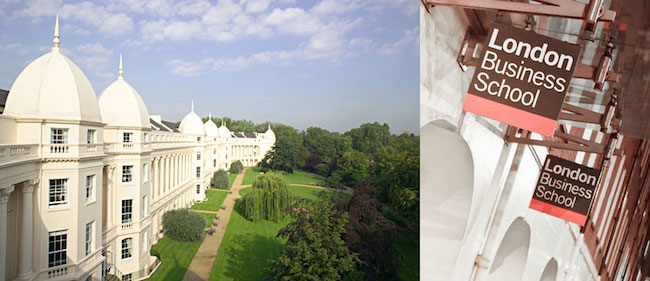London is home to 75% of the top 500 global companies. Its geographic location makes it so 99% of major business activity on earth happens during a standard London workday. Nearly $2 trillion in foreign exchange is turned over in The City on a daily basis. And London boasts 1,000 new startups each month, 7,855 business or finance firms, 264 foreign banks and 37% of the global exchange market.
So it goes without saying London Business School (LBS) provides some of the best opportunities in the world for networking and hands-on learning. And that’s just in London. LBS also offers a clone EMBA program in Dubai. The school first introduced executive education programming in 1966, two years after the school was founded. In 1992, the EMBA was launched. Nearly a decade later LBS partnered with Columbia Business School to create one of the world’s first global EMBA program.
In 2007, the Dubai campus opened and in 2009, the school created the global-Asia EMBA program with Hong Kong University and Columbia Business School. There are currently 10,000 executives participating in some form of executive education at LBS.
Nicola Simpson came to London Business School after a 15-year career in various marketing management and executive roles and serving as a visiting lecturer at the University of Greenwich. After three years of heading up the executive education short programs, she took over the EMBA program last March. Serving as the program director of the EMBA program at LBS, Simpson has already seen market changes and has adjusted London’s program accordingly.
In a wide-ranging interview with Poets&Quants, Simpson discusses everything from the collaborative spirit of LBS to launching the first MOOC to why the LBS EMBA is still entirely a face-to-face program set in real and not virtual classrooms.
Poets&Quants: What is LBS doing in the space that is new and different?
Nicola Simpson: One of the things to highlight is we have two campuses. So we deliver our EMBA at the London campus and the Dubai campus. This makes us different from other players in the market. But it is still a single program. Everything is aligned in terms of curriculum; students just have the opportunity to select location.
The main difference (between programs) is the structure of the model. In London, students meet on Fridays and Saturdays every other weekend. At Dubai, students meet once a month but for four straight days. This allows students to undertake an EMBA program that fits best in terms of geographic location and study mode. Coming to London twice a month might be more convenient than Dubai for four days at a time.
The other thing that makes our EMBA different is in the second year, the students are able to really customize by accessing our entire portfolio of courses. There are more than 70 electives available and students can pick and choose what they want. They can customize based on areas of interest or areas of future career aspirations. They also have the opportunity to mix in with other degree programs. They can get outside of their cohort and into the masters in finance or full-time programs. This allows a rich and deep learning experience. Also, it extends the network and gives opportunity to learn from others.
As a school, we really do have a global perspective. We offer students lots of opportunity to travel. Students in both Dubai and London can take an international assignment. We run them in five different locations in addition to Dubai. Students can go to Argentina, South Africa, Beijing, the United States or Russia.
We also have relationships with partner schools. One of them is Columbia Business School in New York. We try to allow them to engage in exchange opportunities like taking a course at Columbia while in our program. Again, this enables them to build an individual network and gives them more of a global outlook. We really do encourage all to apply and have great diversity.Obviously there are many students from Europe and the Middle East but we also have a lot of students commuting in from far away.
But it is not just our students. We have around 130 faculty at LBS and more than 31 different countries are represented on our faculty. Our Dubai students have equal access to those faculty members. We strive to have an equal learning experience.
P&Q: How is new technology impacting London’s program?
Basically, like most schools, we are impacted by new technology in terms of opportunities to enhance teaching and learning. We will actually launch our first MOOC next year. There is nothing specific to EMBAs yet but at a school level we are experimenting with online. A key potential change for us is looking at how we can include the EMBA students online, bearing in mind a portion of them are commuting. We don’t want to go online just to go online. It’s not just about talking heads and filming it. We are looking at how we can build technology while also building diversity in the student population. Also, how can we continue to bring students together for social learning and networking?
Right now we continue to be entirely face-to-face and will probably keep the majority of interactions that way. The experimenting is really looking at the degree to which we should incorporate online. There will probably be a day when we offer a blended program. We are just not there yet.






Questions about this article? Email us or leave a comment below.